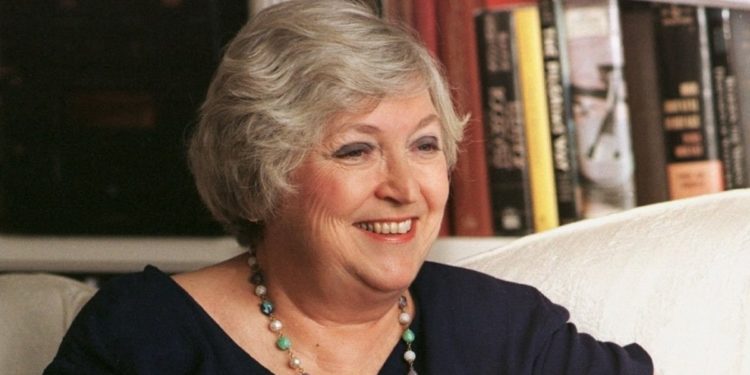When the U.S. bishops sensed a growing willingness — and restlessness — among the laity to serve the Catholic Church in the post-Vatican II world, they sought someone who could navigate those seemingly contradictory impulses.
Dolores Leckey became that person.
Leckey served as the founding executive director of the bishops’ Secretariat for Family, Laity, Women and Youth, from 1977 to her retirement in 1997.
A funeral Mass for Leckey was celebrated Jan. 26 at Our Lady Queen of Peace Church in Arlington. Leckey, 89, died Jan. 17.
Born in New York City as one of 10 children to Irish immigrants, Leckey helped shape the notion of what lay ecclesial ministry could look like, both partnering with and supporting local bishops.
In her role, Leckey became a groundbreaker herself, as the first laywoman to head a secretariat of the U.S. Conference of Catholic Bishops.
“Her energy came from her faith. She was deeply committed to what she was doing, but first and foremost, her faith in God moved her each day to do what she was called to do,” said Mercy Sister Sharon Euart, who broke new ground as the first woman to serve as a USCCB associate general secretary.
Leckey “felt called to help the bishops — to help the bishops understand what the role of laity, family and women were in the Church,” Sister Euart told the Catholic Standard. “It wasn’t easy, there were a lot of challenges, especially around the women’s issues. … But she could do it in a way that it was grounded in the Gospel, and grounded in faith.”
“Dolores Leckey is one of American Catholicism’s great unsung heroes,” said Edward P. Hahnenberg, the Breen Chair in Catholic theology at John Carroll University in Cleveland, and the author of “Theodore Hesburgh, CSC: Bridge Builder.” “I don’t know if there is anyone who played a greater role in helping the hierarchy hear the voices of the laity in the decades that followed Vatican II.”
“Dolores was especially welcoming and collegial with the lay staff at the bishops’ conference. She encouraged us to do our best work and often suggested new dimensions for expanding its significance,” said John Borelli, a former key official in the U.S. bishops’ Secretariat for Ecumenical and Interreligious Affairs, and currently the special assistant to the president for Catholic identity and dialogue at Georgetown University.
“I was encouraged to observe how bishops respected her leadership and how well she managed internal relationships on the staff when most offices were headed by priests,” Borelli added. “Away from the (bishops’) conference, she enjoyed the company of her co-workers and their husbands and wives.”
Leckey was in great demand as a writer and speaker. She contributed to Catholic News Service’s weekly “Faith Alive!” religious education package, and her addresses at conferences often found their way into Origins, CNS’ documentary service.
She also wrote several books, among them “Women and Creativity,” “The Laity and Christian Education,” “7 Essentials for the Spiritual Journey,” “Facing Fear With Faith,” and “Grieving With Grace: A Woman’s Perspective.”
Leckey also wrote a memoir touching upon her spiritual, personal and professional journey. Titled “Reviewed: Scenes From a Long Life,” it was published one month before she died.
“I think she knew it was going to be her last book. We worked pretty steadily to get it done over the past year,” said her editor, Ellen Collins.
In “Reviewed,” Leckey expresses her fondness for Benedictine spirituality; mourns for her brother Jack, who returned from World War II with post-traumatic stress disorder and, after arranging for passports for his two sons to attend military school in Europe, “was never seen or heard from again”; and does not chronicle the adventures she had in her career so much as revels in the relationships she enjoyed with clerics and laity who shared in those adventures.
Collins quoted Leckey about another aspect of “Reviewed”: “The book is also about the experience of aging, as told from the inside.”
When Leckey was hired by the U.S. bishops in 1977 to head up a new “Dept. of the Laity.” “there wasn’t even a paper clip,” she recalled. Three years later, she was an official adviser to the U.S. bishops at the 1980 Synod of Bishops on the family. She also served as an official adviser at the 1987 laity synod in Rome.
In 1998, she joined the Woodstock Theological Center at Georgetown University in Washington as a senior fellow. Leckey coordinated its Church Leadership Program, a weeklong retreat of prayer, study and exchange of experiences to help church leaders develop a spirituality and management style to guide their communities in contemporary society.
In addition to plentiful awards and recognitions, Leckey received honorary doctorates from 13 universities. She saved all of the hoods from those commencement exercises, and sewed them into a quilt.
In a 1997 interview, Leckey said she hoped that her grandchildren — now grown — would find the Church “a welcoming place … that can give them meaning,” committed to interreligious dialogue and tolerance, one that imbues “a sense of responsibility and mission to the world.” It would keep alive the mystical tradition, and teach the sanctity of marriage and family life and care for those in trouble.
“I hope that they’ll find the Church a fun place to be, and not a dreary, gloomy place. And, of course,” she added with her characteristic laugh, “where they’re growing green things and recycling.”
(Mark Pattison, formerly a longtime writer for the Catholic News Service in Washington, is a freelance writer.)
Credit: Source link




